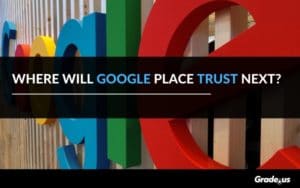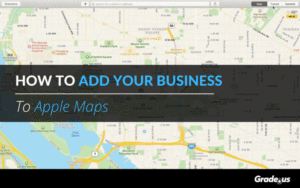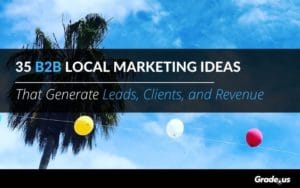Give me what I want, or else.
Customers expect you to give them what they want. They expect you to get them, to "do your research." It's a paradox though, isn't it?
They expect you to know but they refuse to tell.
When you do use your research, customers often respond with frustration and fear. "Behavioral targeting? That's so incredibly creepy! Ads? I hate ads with a passion," consumers aren't fond of tracking and that's the problem.
Location marketing is a problem because...
It's creepy.
It hasn't gone mainstream yet, but it's already being listed by journalists as "creepy." But, is location marketing really the problem? Is it a catchy buzzword or an indispensable part of your marketing?
Believe it or not, it's quickly becoming indispensable.
How do we know?
Customers tell us.
1. More and more customers expect us to know (and remember) details about them, yes, the very same details they may be unwilling to share.
2. These very same customers expect personalization and customization, which is more often than not, viewed as the starting point.
3. They also expect you to make them wildly successful, which as it turns out, requires information. About them.
What can give you the conclusive answers you need to meet your customer's incredibly high expectations?
Location marketing.
Is it a problem if you don't know what location marketing is?
What exactly is "location marketing?"
The Mobile Marketing Association defines location marketing as:
“Any application, service, or campaign that incorporates the use of geographic location to deliver or enhance marketing message/service.”
Sounds a bit vague, doesn't it?
How does location-based marketing work? What does it look like?
- Beacons are low energy Bluetooth devices that marketers can use to broadcast deals, discounts and special offers to compatible apps and devices (e.g. tablets, smartphones) enabled to receive their messages. Marketers can use these beacons to welcome fans at a concert or sporting event, provide information on a museum exhibit, or incentivize customers to buy. Customers opt-in when they download a compatible app.
- Wi-Fi hot spots. Bricks and clicks retailers are using their Wi-Fi hotspots to launch and run location marketing campaigns. Customers who log-on to your Wi-Fi receive marketing messages. Restaurants and retailers uses Wi-Fi hotspots to attract email addresses, generate traffic, leads and sales.
- Geofencing uses GPS to create a virtual, geographic boundary. Apps are then able to trigger a response when a customer physically enters or leaves a particular area, usually the physical boundaries of the bricks and mortar store itself.
- Location awareness platforms like Placed use a combination of statistical models, location platforms, and a location database to provide marketers with specific, detailed and actionable demographics – data you can use in all kinds of creative ways.
- Local search advertising. Google, Facebook, Snapchat and other providers have slowly integrated location based marketing into their platforms.
But why?
This seems like a lot of extra fuss for a few location based extras. What's the big deal?
Location marketing = local marketing?
85 to 95 percent of consumer engagement with brands happens via location-based assets like local listings and local pages. So, does this mean it's really all about targeting a specific place or places?
Actually, No.
80 percent of mobile phone users have smartphones. These devices provide marketers with a consistent stream of data, and the tools they need to build in-depth customer profiles. That's data you can use to give customers what they actually want.
At the individual level, location data can map the buyer's journey, giving marketers detailed accounts of customer interests.
The apps you have:
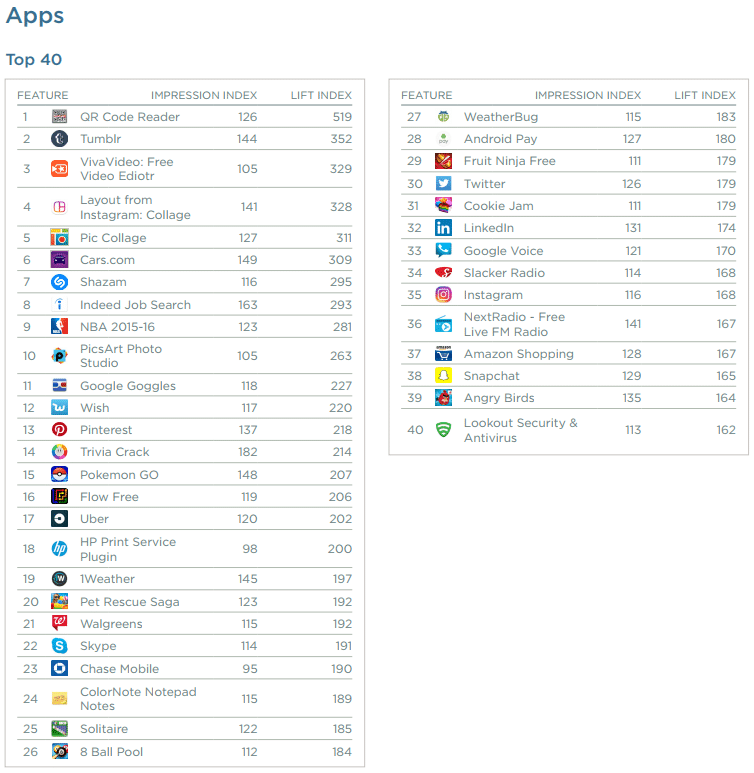
Where you shop:
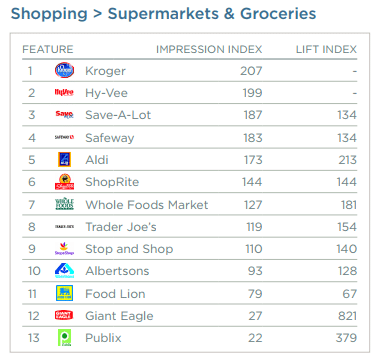
Where you like to eat:
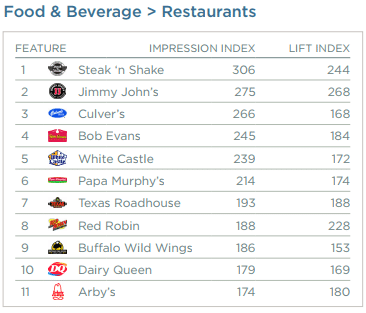
When you have free time:
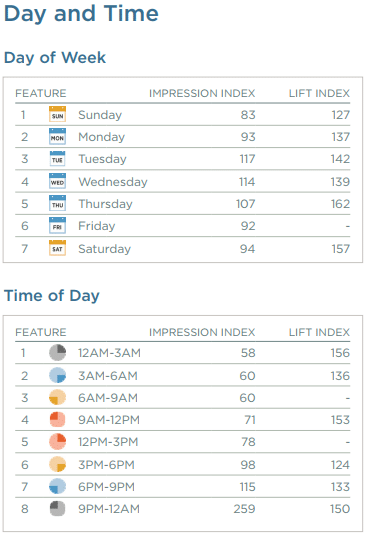
Whether you exercise (or not):
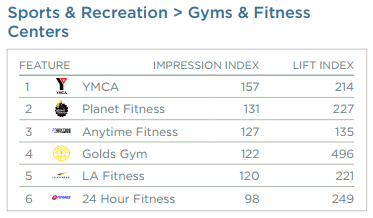
How you entertain yourself, and more.
With location marketing you have access to a mountain of data.
How is this not creepy?
It's absolutely creepy for companies to collect this data quietly, stealthily and without their customer's knowledge. That's incredibly creepy and, in some respects, it's also a breach of trust.
But, you need this data if you're going to compete effectively.
So, what do you do?
You do the obvious thing, you ask for the data you need. Cue the eye rolls, "Why would customers give you their data voluntarily?" They'll give you their data, because they want to make a trade.
Your customers want to sell out, to you
Your customers crave personalization.
They're overwhelmed; there's a limitless supply of people and businesses competing for their attention. They're pressed for time and forced to do more with less.
Your customers are exhausted. They're willing to trade their data, if you're willing to treat them like they matter (which you probably already do).
Don't believe me?
Take a look at these beauties:
- Please Take My Data: Why Consumers Want More Personalized Marketing
- 70% Of Consumers Want More Personalized Shopping Experiences
- Consumers Want Personalization In Exchange for Their Data
- Salesforce: State of the Connected Consumer
Customers know you're getting a ton of data from them. Not only that, they're willing to give you more, if you're willing to give them what they want in return.
What does this mean for you?
Location marketing is synonymous with local marketing, and that trend is only going to grow. All signs point to location marketing becoming an integral part of your marketing strategy. It isn't mainstream, but that doesn't mean location marketing isn't essential.
Location marketing is really about getting to know your customers.
It's about meeting them where they are, giving them what they want and need, when they need it.
If it's so essential, how are you getting by without it?
It's essential now.
Brands are losing traffic, leads and sales now. As recently as 2017, local brands weren't showing up in the search results for broad, long-tail and branded keywords. Local businesses are losing money, but the consequences aren't as dire, yet.
Let's say you wanted to take advantage of location marketing, where should you start?
1. Link local listings pages to location specific web pages. If you have a Google Maps listing, link visitors to location based pages on your site. Arby's links their Google Maps listing to locations.arbys.com. It's an easy and obvious win.
2. Invest in location specific advertising. Purchase location specific terms on Google AdWords, target locals on Facebook, etc. Use advertising to boost or supplement organic mobile map search results.
3. Optimize map listings. Use appropriate descriptions, content and links to local listings.
4. Integrate location marketing seamlessly. Your customers have enough on their plate, use location marketing to make relevant and appropriate offers. Offer discounts, incentives and rewards. Tie location marketing in with your other marketing initiatives, but only if it's relevant.
5. Give customers a reason to care. Use location-based tools to entice customers to share their interest and usage data. Give them a compelling reason or incentive to share their data.
Simply getting by costs money.
It costs local businesses traffic, leads and sales.
Location marketing is essential, but overwhelming
This is probably outside the realm of expertise for most SMBs. But it would still be overwhelming, even if it was something most small businesses could handle.
Wondering why?
Because most small businesses, at least in the beginning, spend their time running from one fire to the next. There’s far too much on the average business owner’s plate and no way for them to handle it all.
Small businesses need help.
If you’re an agency, consultant or marketer, this is a huge opportunity. Add location marketing to your service offering and suddenly you’re ahead of the curve. Location marketing isn’t mainstream, but soon it will be.
Not sure where to start?
Here’s a few guides you can use to get started with Location marketing.
- Location based marketing made easy: A marketer’s guide
- Location marketing made easy
- Getting Noticed: The Location Based Marketing Guide for Advertising that works for Today’s Customers
Location marketing gives you the tools and resources you need to add value to your local digital service offerings, but only if you give customers what they want.
"Give me what I want, if you want my money"
Customers expect you to understand them. They're not willing to share their secrets unless you give them what they want. It's a reasonable expectation, even if it is a catch 22.
Location marketing is more than a buzzword, it's the future.
As the demand for your customer's attention grows, their willingness to share their data decreases. Most aren't open to disruptive advertising, they're looking for specialized attention. Day by day, your customer's demand for customization, personalization and service grows.
Your marketing strategy should grow with their demands. Use location marketing to understand your customer desires and you'll find they're eager to give you everything you want.
About the Author
Andrew McDermott
Andrew McDermott is the co-founder of HooktoWin. He shows entrepreneurs how to attract and win new customers.




